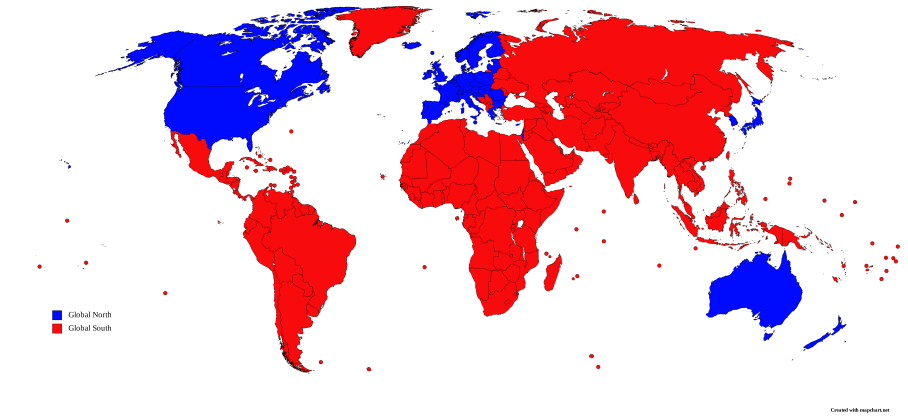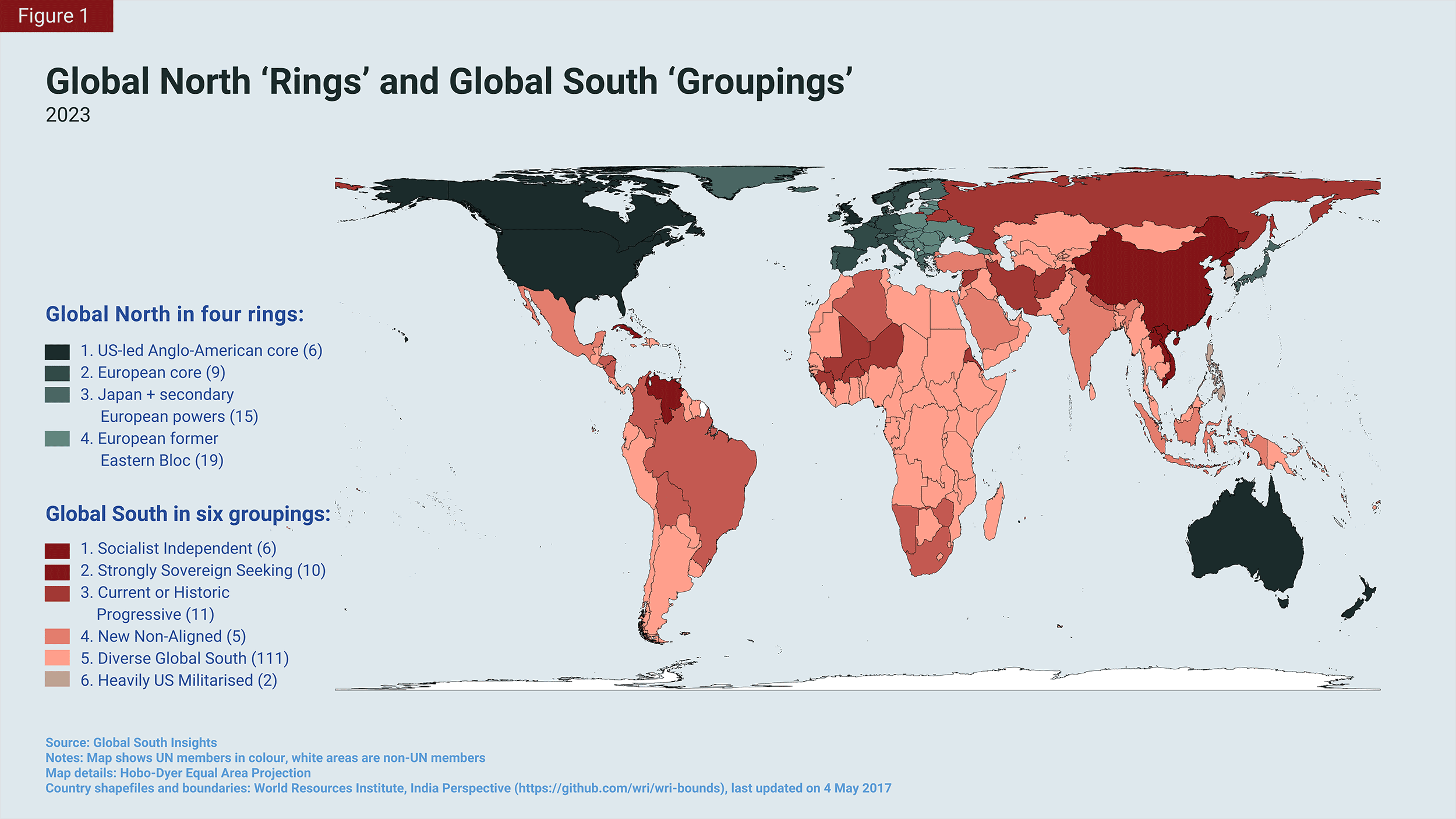More languages
More actions
m (fixed a typo) Tag: Visual edit |
No edit summary Tag: Visual edit |
||
| (24 intermediate revisions by 9 users not shown) | |||
| Line 1: | Line 1: | ||
[[File:1920px-North South divide.svg.png|thumb|Global North | {{Message box/Missing Sources}}[[File:1920px-North South divide.svg.png|thumb|Global North countries are in blue, Global South countries are in red.<ref group="note">Map made by the ProleWiki editorial team. Some countries are contested whether they are part of the Global North or Global South, particularly in Eastern Europe and the Balkans. The classification also depends on their relationship to imperialism.</ref>]] | ||
In geopolitics, the Global South is a general term that roughly designates | [[File:Tricontinental Global North and South map.png|thumb|More detailed map from the [[Tricontinental]] dividing the Global North and South into subgroups]] | ||
In [[geopolitics]], the '''Global South''' is a general term that roughly designates the economically exploited countries.<ref name=":1" /> In contrast, the '''Global North''' encompasses the [[Imperial core|most advanced capitalist countries]],<ref name=":1">IGI Global Publisher Dictionary, "[https://www.igi-global.com/dictionary/global-northsouth/50101 What is Global North/South?]"</ref> whose wealth was largely stolen [[capital]] generated from [[colonialism]] and [[imperialism]].<ref name=":0">LENIN; Vladimir, Imperialism: The Highest Stage of Capitalism ([https://www.marxists.org/archive/lenin/works/1916/imp-hsc/ Read on Marxists.org])</ref> "Global South" is separate from, but not mutually exclusive, to the reality of [[settler-colonialism]] as some global south countries can also be settler-colonial.{{Citation needed}} | |||
To be a global south country is to be a country whose economy is suppressed under the conditions of imperialism.<ref name=":2">{{Citation|author=Lemuel Ekedegwa Odeh|year=2010|title=A COMPARATIVE ANALYSIS OF GLOBAL NORTH AND GLOBAL SOUTH ECONOMIES|title-url=https://jsd-africa.com/Jsda/V12No3_Summer2010_A/PDF/A%20Comparative%20Analysis%20of%20Global%20North%20and%20Global%20South%20Economies%20(Odeh).pdf|chapter=Abstract|quote=|city=Clarion, Pennsylvania|publisher=Clarion University of Pennsylvania}}</ref> The [[Marxism|Marxist]] usage of the "global south" follows the line used by AES countries like [[People's Republic of China|China]] according to the Marxist understanding of global [[imperialism]].{{Citation needed}} China is considered to be part of the South,<ref name=":2" /> despite them having achieved the highest GDP in the world in purchasing power parity.<ref>{{Web citation|newspaper=World Economics|title=Economies by GDP Size|url=https://www.worldeconomics.com/Rankings/Economies-By-Size.aspx}}</ref> [[Israel]] is considered to be part of the Global North,<ref name=":2" /> due to its establishment by and advancing the imperial interests of the Global North.{{Citation needed}} | |||
The term [[Third World]] is also sometimes used to talk about the Global South, but is considered to be outdated even by imperialist organizations.<ref>{{Web citation|newspaper=World Bank|title=Old concept of “Third World” outdated, Zoellick says|date=2010-04-14|url=https://www.worldbank.org/en/news/press-release/2010/04/14/old-concept-of-third-world-outdated-zoellick-says|archive-url=https://archive.ph/wip/VAw0a}}</ref> | |||
The term | The term "developing countries" is misleading too, as it ignores the fact that the "developed" countries are the ones imperializing them, overexploiting and making them [[Dependency|economically dependent]] on export/imports from or to the Global North.<ref name=":0" /> | ||
In 1500, the average income in [[Europe]] was only three times higher than in [[Africa]] and [[Asia]], but that difference grew to 10 times by 1960.<ref name=":12222">{{Citation|author=[[Vijay Prashad]]|year=2008|title=The Darker Nations: A People's History of the Third World|chapter=Buenos Aires|page=66|pdf=https://cloudflare-ipfs.com/ipfs/bafykbzaceascnzh26r5d6uitjjs2z7rflhaxlt7rboz5whzdf76qg6xxvecqq?filename=%28A%20New%20Press%20People%27s%20history%29%20Vijay%20Prashad%20-%20The%20darker%20nations_%20a%20people%27s%20history%20of%20the%20third%20world-The%20New%20Press%20%282008%29.pdf|publisher=The New Press|isbn=9781595583420|lg=https://libgen.rs/book/index.php?md5=9B40B96E830128A7FE0E0E887C06829F}}</ref> In addition, in 1960, the richest 20 countries were 18 times as rich as the 20 poorest countries in terms of GDP per capita. This ratio grew to 37 times in 1995.<ref name=":1222">{{Citation|author=[[Vijay Prashad]]|year=2008|title=The Darker Nations: A People's History of the Third World|chapter=Conclusion|page=277|pdf=https://cloudflare-ipfs.com/ipfs/bafykbzaceascnzh26r5d6uitjjs2z7rflhaxlt7rboz5whzdf76qg6xxvecqq?filename=%28A%20New%20Press%20People%27s%20history%29%20Vijay%20Prashad%20-%20The%20darker%20nations_%20a%20people%27s%20history%20of%20the%20third%20world-The%20New%20Press%20%282008%29.pdf|publisher=The New Press|isbn=9781595583420|lg=https://libgen.rs/book/index.php?md5=9B40B96E830128A7FE0E0E887C06829F}}</ref> | |||
== References == | |||
<references /> | |||
=== Notes === | |||
<references group="note" /> | |||
[[Category:Global south]] | |||
[[Category:Global north]] | |||
[[Category:Geopolitics]] | |||
Latest revision as of 11:27, 14 August 2024
This article is missing sources. Please do not take all information in this article uncritically, since it may be incorrect. |


In geopolitics, the Global South is a general term that roughly designates the economically exploited countries.[1] In contrast, the Global North encompasses the most advanced capitalist countries,[1] whose wealth was largely stolen capital generated from colonialism and imperialism.[2] "Global South" is separate from, but not mutually exclusive, to the reality of settler-colonialism as some global south countries can also be settler-colonial.[citation needed]
To be a global south country is to be a country whose economy is suppressed under the conditions of imperialism.[3] The Marxist usage of the "global south" follows the line used by AES countries like China according to the Marxist understanding of global imperialism.[citation needed] China is considered to be part of the South,[3] despite them having achieved the highest GDP in the world in purchasing power parity.[4] Israel is considered to be part of the Global North,[3] due to its establishment by and advancing the imperial interests of the Global North.[citation needed]
The term Third World is also sometimes used to talk about the Global South, but is considered to be outdated even by imperialist organizations.[5]
The term "developing countries" is misleading too, as it ignores the fact that the "developed" countries are the ones imperializing them, overexploiting and making them economically dependent on export/imports from or to the Global North.[2]
In 1500, the average income in Europe was only three times higher than in Africa and Asia, but that difference grew to 10 times by 1960.[6] In addition, in 1960, the richest 20 countries were 18 times as rich as the 20 poorest countries in terms of GDP per capita. This ratio grew to 37 times in 1995.[7]
References[edit | edit source]
- ↑ 1.0 1.1 IGI Global Publisher Dictionary, "What is Global North/South?"
- ↑ 2.0 2.1 LENIN; Vladimir, Imperialism: The Highest Stage of Capitalism (Read on Marxists.org)
- ↑ 3.0 3.1 3.2 Lemuel Ekedegwa Odeh (2010). A COMPARATIVE ANALYSIS OF GLOBAL NORTH AND GLOBAL SOUTH ECONOMIES: 'Abstract'. Clarion, Pennsylvania: Clarion University of Pennsylvania.
- ↑ "Economies by GDP Size". World Economics.
- ↑ "Old concept of “Third World” outdated, Zoellick says" (2010-04-14). World Bank. Archived from the original.
- ↑ Vijay Prashad (2008). The Darker Nations: A People's History of the Third World: 'Buenos Aires' (p. 66). [PDF] The New Press. ISBN 9781595583420 [LG]
- ↑ Vijay Prashad (2008). The Darker Nations: A People's History of the Third World: 'Conclusion' (p. 277). [PDF] The New Press. ISBN 9781595583420 [LG]
Notes[edit | edit source]
- ↑ Map made by the ProleWiki editorial team. Some countries are contested whether they are part of the Global North or Global South, particularly in Eastern Europe and the Balkans. The classification also depends on their relationship to imperialism.
